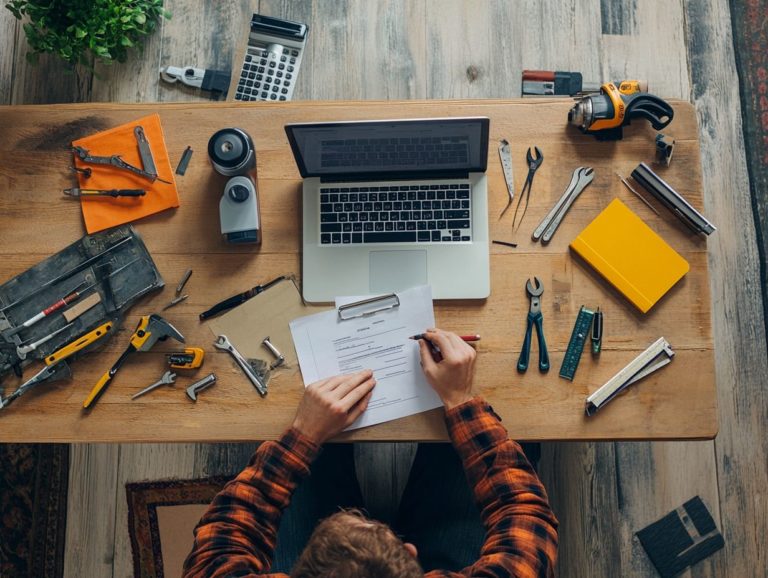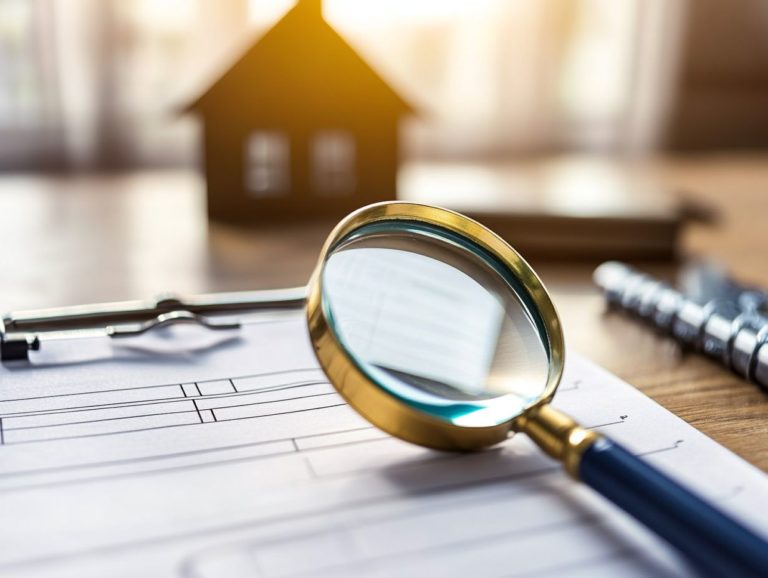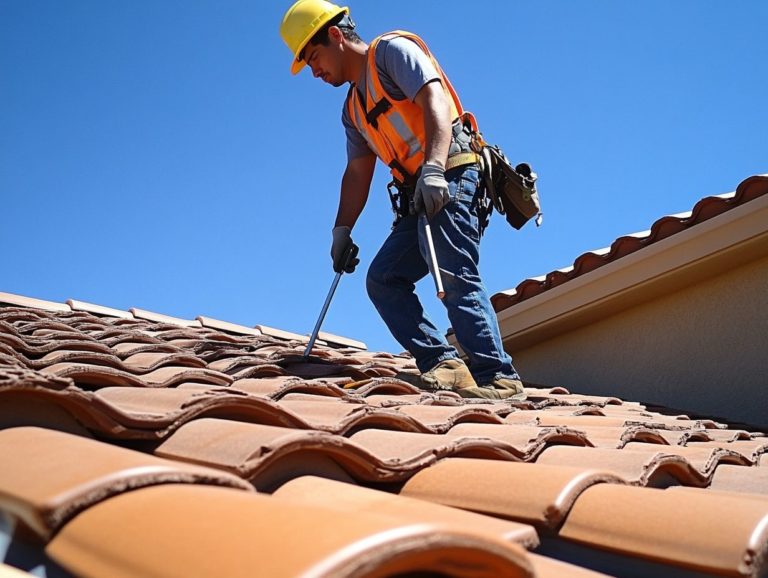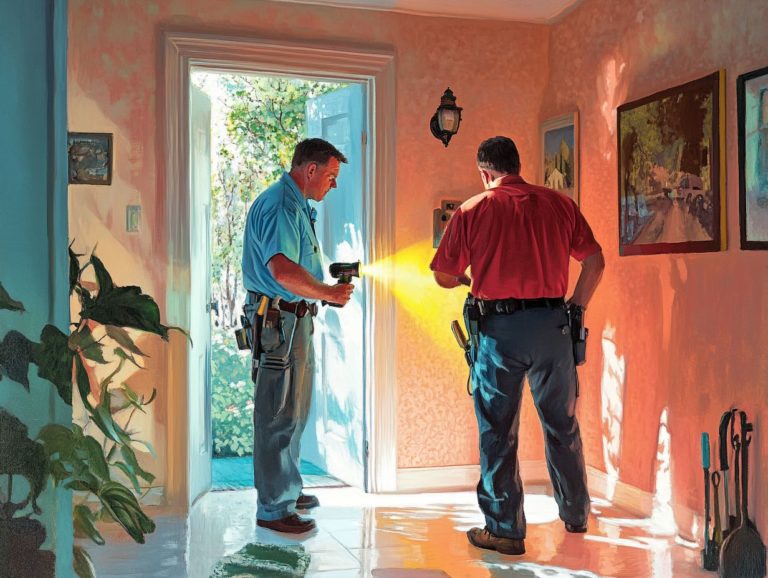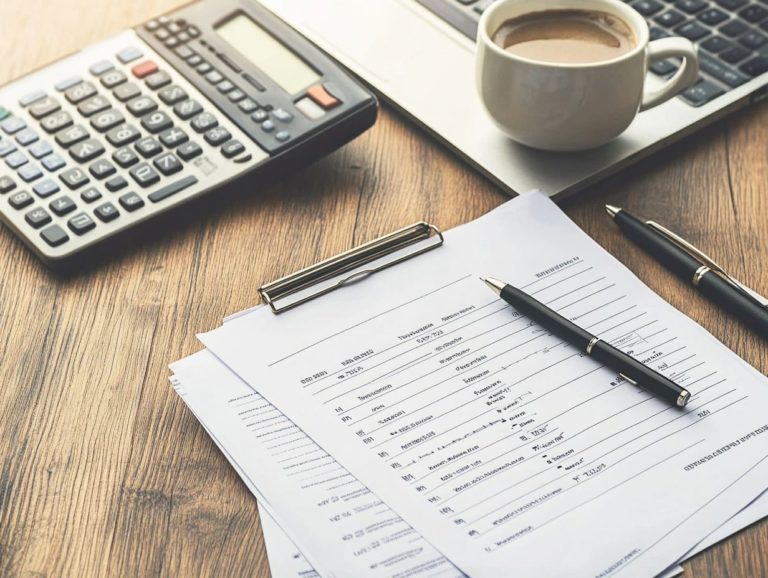How to Ensure Your Home is Inspection-Ready
When it comes to home ownership, understanding the importance of home inspections is essential. These assessments do more than just reveal potential issues; they also offer you peace of mind, whether you’re buying or selling.
This article delves into the purpose and advantages of home inspections, guiding you through the preparation process. It highlights common areas that inspectors scrutinize and discusses how to tackle any necessary repairs or upgrades.
You will also find valuable tips to maintain your home in peak condition, ensuring it’s always ready for inspection. Get ready to enhance your home s value and impress potential buyers!
Contents
- Key Takeaways:
- Why Home Inspections are Important
- Preparing for a Home Inspection
- Common Areas Inspected
- Addressing Potential Issues
- Maintaining a Home Inspection-Ready Home
- Frequently Asked Questions
- What is the importance of ensuring my home is inspection-ready?
- How often should I prepare my home for an inspection?
- What are some steps I can take to ensure my home is inspection-ready?
- Can I perform an inspection on my own?
- What should I do if an issue is found during an inspection?
- Is there anything I should avoid doing before an inspection?
Key Takeaways:

Regular inspections save time and money by finding issues early. Before a home inspection, learn how to prepare by decluttering, cleaning, and making necessary repairs to ensure a smooth process. Stay on top of maintenance tasks and address potential issues promptly to keep your home inspection-ready.
Why Home Inspections are Important
Home inspections are essential in the real estate market, helping you, whether as a buyer or seller, understand property evaluations with confidence.
A skilled home inspector evaluates the overall condition of the property, delivering a detailed inspection report that highlights potential issues, safety features, and advantages that can bolster your negotiating position as a seller.
Understanding these elements is crucial for both parties, ensuring a seamless closing process while maximizing the property’s value.
The Purpose and Benefits of Home Inspections
Home inspections are critical for uncovering potential issues within a property, ranging from significant repairs to minor defects. This discovery can influence your decision as a home buyer.
But it s not just about identifying problems; these evaluations also serve to educate you on the property’s overall condition. With this knowledge, you can strategically plan for necessary repairs and renovations, equipping yourself with a clearer financial perspective.
Gaining insight into the true state of a home offers invaluable peace of mind, easing any concerns about unexpected surprises after the purchase.
For sellers, home inspections can be equally advantageous. By identifying and addressing potential problems in advance, they enhance the property s marketability, sidestep renegotiations, and build trust with buyers.
This proactive approach often leads to smoother transactions, benefiting everyone involved.
Preparing for a Home Inspection
Effective preparation for a home inspection can significantly impact the outcomes for both sellers and buyers, setting the stage for a comprehensive evaluation by a certified home inspector. For sellers, knowing how to prepare for a home inspection is crucial.
By proactively addressing major repairs and minor issues in advance, you ensure a smoother inspection experience and more favorable results.
This thoughtful approach lays the foundation for a successful transaction, enhancing confidence and clarity for all parties involved.
Steps to Take Before the Inspection

Before the home inspection, it’s crucial to take a few preparatory steps to set the stage for a successful assessment. This includes handling maintenance tasks, cleaning, and preparing for your home inspection by decluttering key areas.
Make it a priority to ensure that access points to essential systems like the HVAC (heating, ventilation, and air conditioning), plumbing, and electrical systems are clear and easily reachable. This clarity enables the inspector to evaluate these vital components without obstacles, saving time and fostering a thorough assessment.
Addressing minor defects, such as chipped paint or loose handles, can significantly contribute to a more favorable inspection outcome. By taking these proactive measures, you demonstrate responsibility and potentially enhance the overall value of your property.
Common Areas Inspected
During a home inspection, the inspector meticulously evaluates several key areas of your property. They’ll focus on crucial elements like the roof, foundation, and essential systems such as electrical and plumbing.
This thorough visual inspection is designed to uncover any potential issues that could impact the safety and overall condition of your home.
Get Ready for Your Home Inspection!
During the inspection, expect a careful look at the property by a qualified home inspector. This professional will create a detailed inspection report outlining any discovered issues.
The process typically starts with a thorough check of the exterior, where the inspector evaluates the roof, siding, and foundation.
Once inside, various components like plumbing, electrical systems, and HVAC units will be checked for functionality and safety. Be ready for a thorough check understanding the issues can save you money!
Understanding these findings is essential, as they can influence your decision-making. This insight empowers you to negotiate repairs or price adjustments, ensuring the home meets your needs.
Addressing Potential Issues
Addressing issues found during a home inspection is crucial for both buyers and sellers, as it greatly influences requests and negotiations.
By tackling major repairs and minor concerns from the inspection report, sellers can increase their property s appeal and maintain a competitive edge in the market.
How to Handle Repairs or Upgrades

Handling repairs or upgrades after an inspection report is essential for presenting a property that shines to potential buyers.
By assessing the findings, you can prioritize repairs that matter most for your home s condition and marketability.
Start with major repairs; they significantly impact your property’s value and appeal. While minor defects are still worth fixing, buyers can sometimes negotiate those post-sale.
Keep communication open with potential buyers about repair statuses to foster trust, leading to smoother negotiations and better terms for everyone involved.
Maintaining a Home Inspection-Ready Home
To keep your home inspection-ready, commit to regular maintenance that enhances curb appeal and ensures safety features are in top shape. Additionally, following a guide on how to prepare your home for a successful inspection can further help you stay organized.
By addressing minor issues and engaging in routine cleaning and decluttering, you can create an inviting atmosphere that attracts potential buyers and prepares your property for future inspections.
Tips for Keeping Your Home in Good Condition
Keeping your home in great shape requires regular maintenance, including cleaning, decluttering, and checking essential utilities to ensure everything works properly.
By prioritizing these tasks, you can catch potential problems early, protecting your investment and enhancing your comfort.
For example, inspect the seals around your windows and doors to prevent drafts and energy loss. Routine gutter cleaning can avoid water damage from blocked drainage.
Test your smoke detectors monthly and replace the batteries as needed for your safety.
Engaging in these proactive measures sets the stage for a successful home inspection, especially when you know how to prepare for a home inspection, and instills pride in maintaining your property.
Frequently Asked Questions
What is the importance of ensuring my home is inspection-ready?

Ensuring your home is prepared for inspections is crucial for maintaining safety and functionality. It helps increase your home’s value and prevents issues during an inspection.
How often should I prepare my home for an inspection?
Prepare your home for inspection at least once a year. This allows you to catch potential problems early and address them before they escalate. For more comprehensive guidance, check out how to prepare for a home inspection.
What are some steps I can take to ensure my home is inspection-ready?
To make sure your home is ready for inspection, clean and declutter regularly. For detailed steps, check out how to prepare your home for an inspection. Maintain the exterior and fix any repairs.
Keep important documents accessible. This will help the inspector perform their job smoothly.
Can I perform an inspection on my own?
You can inspect your home for issues regularly. However, hiring a professional inspector is a smart choice for a thorough assessment.
They have the skills and tools to find hidden problems you might miss!
What should I do if an issue is found during an inspection?
If an issue arises, address it quickly! This may mean making repairs, replacing broken equipment, or getting professional help.
Ignoring problems can lead to bigger issues later on.
Is there anything I should avoid doing before an inspection?
Avoid making major changes to your home right before an inspection. This can disrupt the process and create new problems.
Also, steer clear of last-minute cleaning. Rushed efforts can lead to a messy environment for the inspector!

